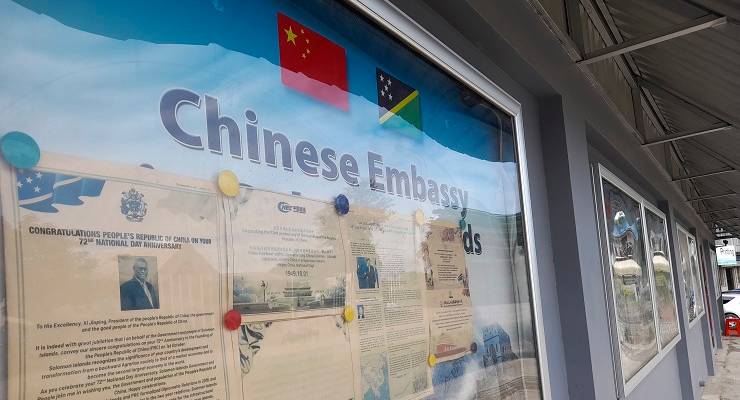
The April 2022 agreement between China and the Solomon Islands is causing alarm, and has rightly been called by Senator Rex Patrick “Australia’s worst intelligence failure” in more than two decades. Alarmist talk has begun about Chinese naval bases interdicting Australia’s sea lines of communication in the south-west Pacific.
But there is another aspect to the agreement that isn’t being discussed: the potential for it to materially improve the lives of Solomon Islanders, and the lessons other Pacific Islands people will learn as a result.
Although China recognises it is a major power, it also sees itself as first among a group of large developing countries.
It is setting up a network of technical training colleges around the world to train foreign students in industrial sensors, control and robotics technologies, machinery equipment manufacturing and high-speed rail technologies.
Students at the Luban Workshops (named after Lu Ban, a mythical figure revered as an inventor) will be trained on Chinese technology with Chinese standards as part of a push to globalise Chinese technology and tighten economic linkages with the Global South.
According to foreign policy scholars Niva Yau and Dirk van der Kley, “the Chinese government has been willing to listen to host countries involved in the Belt and Road Initiative” and help them transfer industrial skills to their own economies and develop their own societies, within the Chinese orbit and using Chinese technology.
It says its relationships with the developing world must go beyond profits to include a “sense of justice” — a sentiment that many developing countries find attractive. This stance gives it a set of common interests with developing states on many issues. Even India, its South Asia rival, aligns its votes in the UN General Assembly more with Beijing than with Washington.
The Solomon Islands has considerable challenges. It ranked 151st in the 2020 Human Development Report, placing it in the category for low human development. It is a very youthful country, with seven out of 10 people aged under 30.
The danger of large numbers of young people who lack income-generating activities or other outlets for their energy and ambition is well known. The neoliberal framework within which Australia has engaged with it has not delivered good social outcomes. Why would it, given its track record?
In this context, development along the Chinese infrastructure-based model might offer improvements in the standard of living. That could send a message to Australia’s traditional vassals in the region — what the prime minister calls “our Pacific family”. They would not necessarily fear closer integration with the Chinese economy.
Australia’s current foreign policy program will require a fundamental rethink.








And the only way Australian foreign policy is going to be rethought and reformed is by Australia electing a government that has some competence and integrity; ie anyone but these idiots!
Can anyone explain to me how Oz’s concerns with the Solomons getting friendly with China, is somehow different to Putin’s concerns about the Ukraine and NATO?
I don’t side with Putin btw…but it just seems like epic hypocrisy.
Happy to be educated if i am missing something here.
We haven’t invaded them, so at least we’re one up there. It’s a low bar, but we did clear it.
It’s true, though, that there’s no particular reason for Solomon Islanders to support Australia over China if we’re not actually doing something for Solomon Islanders, and China’s putting money into the country. Solomon Islanders are mostly interested in their own personal welfare just like anybody in any country is. They won’t reject Chinese money just because China is authoritarian and brutal to their own people – they’ll think ‘well, that couldn’t happen here, and the money is so good.’ People anywhere find it very hard to reject an offer of cash down today.
I think this is pretty spot on on why we shouldn’t equate Australia’s concern about the China and the Solomons with Russia and Ukraine. The situations are very different. Putin is not really “afraid” of NATO as it is nothing but a defensive alliance, since attacking a nuclear armed Russia is not something that any alliance, in its right mind, might do. Russia is invading Ukraine since Putin wants to destroy Ukraine as an independent country and return it to the status of a part of Russia, which it had under Catherine, the so-called great. Australia shows no sign of wanting to make the Solomons part of Australia.
The “Australian Financial Review” has been fanning alarmist stories about why we should be concerned about the China-Solomons agreement. First, they had Christopher Joye claim it was an “existential threat”. Today, a much more reasonable expert on China, Michael Smith, claimed it was a coup because of the strategic significance of Guadalcanal, as shown by the Japanese in WWII. I despair over this alarmism. The Solomons was strategically significant to the Japanese Empire in WWII because a naval and especially an air base there would help the Japanese attack American shipping to Australia, which was the springboard for MacArthur’s forces in rolling up the Japanese positions to the North and North West of Australia and ultimately setting up a base for attacking Japan in a place such as Gaum. It has no inherent strategic significance.
On the other hand, China might use aid to Pacific Island groups to remove any possibility of the US using them as bases for maintaining its military dominance in the Pacific. This might have strategic importance down the track.
“It says its relationships with the developing world must go beyond profits to include a “sense of justice””
I don’t trust China’s sense of justice in this regard, but neither do I (and nor should Solomon Islands) trust Australia’s or the USA’s. I hope that we quickly move beyond the hysterics to work on how to deepen our relationship with our neighbours in a way that actually helps them, but I’m not holding my breath waiting.
No wonder the West, especially the US, doesn’t like China.
China is stealing some of their thunder – expanding their Economic, Educational, Technological, Development skills, and Diplomatic ties with other less developed Countries.
these things are fine when the West does it, but oh look out when China does exactly the same thing.
Hows that working out for Sri Lanka?
Utter Bollocks. Even the Lowy Institute state China has nothing to do with this.
https://en.m.wikipedia.org/wiki/2019%E2%80%93present_Sri_Lankan_economic_crisis#:~:text=The%20ongoing%202019%E2%80%932022%20Sri,weakened%20currency%2C%20and%20rising%20prices.